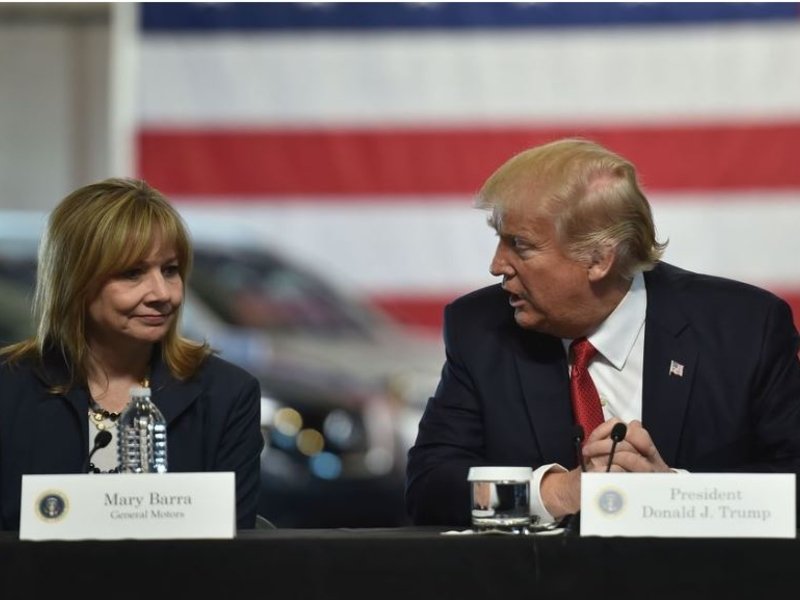
WASHINGTON — General Motors said Monday it is reversing course and will no longer back the Trump administration’s effort to bar California from setting its own emissions rules in an ongoing court fight.
GM CEO Mary Barra said in a letter to environmental groups it is “immediately withdrawing from the preemption litigation and inviting other automakers to join us.”
The dramatic rejection of Trump came as GM sought to work with President-elect Joe Biden, who has made boosting electric vehicles a top priority. GM has laid out an ambitious strategy to boost EV sales and last week said it will increase spending on EVs and autonomous vehicles by 35 percent from previous disclosed plans.
The announcement reflects corporate America’s move to engage quickly with the incoming Democratic administration.
Barra said she believes “the ambitious electrification goals of the president-elect, California, and General Motors are aligned, to address climate change by drastically reducing automobile emissions.”
“GM’s decision reinforces how shortsighted the Trump Administration’s efforts to erode American ingenuity and America’s defenses against the climate threat truly are,” Biden said in a statement. “In addition to advancing our ambitious climate goals, this decision will have a positive ripple effect as our nation strives to outcompete our global competitors, create good-paying union jobs here at home, and reclaim our place as leaders in innovation and manufacturing — all of which will be priorities in my administration.”
The White House did not immediately comment.
GM shares rose 4 percent to close at $44.77 on a day when the company also faced a recall of 7 million vehicles globally with a potential $1.2 billion price tag.
In October 2019, GM joined Toyota Motor Corp., Fiat Chrysler Automobiles and other automakers in backing the Trump administration in its bid to bar California from setting its own fuel efficiency rules or zero-emission requirements for vehicles.
Toyota’s position
Toyota said in a statement Monday that the company has “long supported year-over-year improvements in fuel economy standards” that provide climate and national energy security benefits but it had backed the Trump administration plan “knowing there was a preponderance of other automakers” aligned.
“Given the changing circumstances, we are assessing the situation, but remain committed to our goal of a consistent, unitary set of fuel economy standards applicable in all 50 states,” the company said.
There was no immediate comment from FCA.
California and 22 other states and environmental groups challenged the Trump administration’s determination that federal law bars California from setting stiff tailpipe emission standards and zero-emission vehicle mandates.
Barra was among corporate and labor leaders that met virtually last week with Biden.
Speaking on Monday, Barra said she was “confident that the Biden Administration, California, and the U.S. auto industry, which supports 10.3 million jobs, can collaboratively find the pathway that will deliver an all-electric future.”
The Trump administration in March finalized a rollback of fuel efficiency standards to require 1.5 percent annual increases in efficiency through 2026, well below the 5 percent yearly boosts in Obama administration rules it discarded.
Other automakers, such as Ford Motor Co., Honda Motor Co. and Volkswagen Group, which announced a deal with California in 2019 on emissions requirements that was finalized in August, did not intervene on the administration’s side in the California fight.
Toyota said Monday that “given the changing circumstances, we are assessing the situation, but remain committed to our goal of a consistent, unitary set of fuel economy standards applicable in all 50 states.”
Other automakers backing the Trump administration include Hyundai Motor Co., Mazda, Nissan Motor Co., Kia Motors Corp. and Subaru Co.
GM had drawn the ire of many California officials and environmental groups.
More reactions
Dan Becker, director of the Safe Climate Transport Campaign, said “GM tried to prevent California from protecting its people from tailpipe pollution. They were wrong. Now the other automakers must follow GM and withdraw support for (President Donald) Trump’s attack on clean cars.”
In September, California Gov. Gavin Newsom said the state planned to ban the sale of new gasoline powered passenger cars and trucks starting in 2035 in a bold move to reduce greenhouse gas emissions.
California is the largest U.S. auto market, accounting for about 11 percent of all U.S. vehicle sales, and many states choose to adopt its green vehicle mandates.
U.S. Sen. Gary Peters, D-Mich., who won a highly contested race for a second term, praised GM’s decision.
“It is critical that the American auto industry wins the global race to own the 21st century car market,” he said in a statement. “Today’s announcement from General Motors is a welcome step towards ensuring that – working together – we can meaningfully address climate change while putting our auto industry on a path to success.”
Automotive News and Bloomberg contributed to this report.